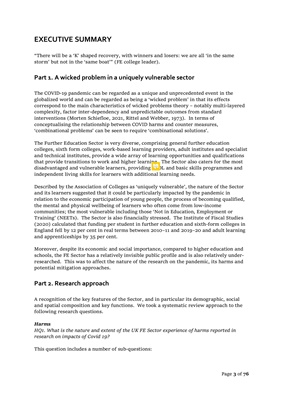
Page 3 of 76
EXECUTIVE SUMMARY
"There will be a 'K' shaped recovery, with winners and losers: we are all 'in the same
storm' but not in the 'same boat'" (FE college leader).
Part 1. A wicked problem in a uniquely vulnerable sector
The COVID-19 pandemic can be regarded as a unique and unprecedented event in the
globalized world and can be regarded as being a 'wicked problem' in that its effects
correspond to the main characteristics of wicked problems theory - notably multi-layered
complexity, factor inter-dependency and unpredictable outcomes from standard
interventions (Morten Schiefloe, 2021, Rittel and Webber, 1973). In terms of
conceptualising the relationship between COVID harms and counter measures,
'combinational problems' can be seen to require 'combinational solutions'.
The Further Education Sector is very diverse, comprising general further education
colleges, sixth form colleges, work-based learning providers, adult institutes and specialist
and technical institutes, provide a wide array of learning opportunities and qualifications
that provide transitions to work and higher learning. The Sector also caters for the most
disadvantaged and vulnerable learners, providing ESOL and basic skills programmes and
independent living skills for learners with additional learning needs.
Described by the Association of Colleges as 'uniquely vulnerable', the nature of the Sector
and its learners suggested that it could be particularly impacted by the pandemic in
relation to the economic participation of young people, the process of becoming qualified,
the mental and physical wellbeing of learners who often come from low-income
communities; the most vulnerable including those 'Not in Education, Employment or
Training' (NEETs). The Sector is also financially stressed. The Institute of Fiscal Studies
(2020) calculated that funding per student in further education and sixth-form colleges in
England fell by 12 per cent in real terms between 2010-11 and 2019-20 and adult learning
and apprenticeships by 35 per cent.
Moreover, despite its economic and social importance, compared to higher education and
schools, the FE Sector has a relatively invisible public profile and is also relatively underresearched.
This was to affect the nature of the research on the pandemic, its harms and
potential mitigation approaches.
Part 2. Research approach
A recognition of the key features of the Sector, and in particular its demographic, social
and spatial composition and key functions. We took a systematic review approach to the
following research questions.
Harms
HQ1. What is the nature and extent of the UK FE Sector experience of harms reported in
research on impacts of Covid 19?
This question includes a number of sub-questions: